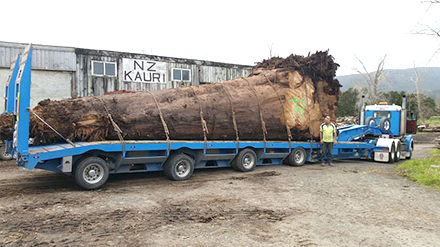
New Zealand’s Supreme Court has ruled it is unlawful to export slabs of kauri as tabletops. For years, the Ministry for Primary Industries has allowed the controversial exports, maintaining they met the definition of finished or manufactured objects set out in the Forests Act. Source: Radio New Zealand
The Northland Environmental Protection Society (NEPS) has challenged that view in the High Court and Court of Appeal and lost. But the highest court in the land has now found the Society was correct all along.
The Forests Act defines a finished or manufactured product as one that is in its final form and ready to be used without further modification. In a unanimous decision, the Supreme Court said a table-top without legs did not fit that definition and could not be exported. NEPS said the majority of the swamp kauri trade involved the export of timber slabs as “table tops”.
The effect of the Supreme Court’s decision would be to shut down most of the export industry as it currently operates, it said. NEPS president Fiona Furrell said the group was elated with the judgement.
“It’s been a very long battle and it’s sad it has taken so long for this win,” she said. “We have lost so many wetlands in the process while we’ve been fighting this that could have been saved and should have been saved.”
One of Northland’s best-known swamp kauri companies, Nelson’s Kaihu Kauri Gallery was waiting to hear from MPI on how the decision would affect its activities. Owner Nelson Parker said he had an export consignment of tables and table tops ready to go, and could not believe the government would allow the trade to be stopped.
“There may not be any major consequences. We employ up to 10 people here and I do know the government, whether it’s Labour or National, are in for people like us: small business employers, they’re not going to forsake us,” he said.
“We’ve got a good product and the world knows it and if they have to come to New Zealand to get [it] that’s good.”
MPI has in the past also allowed the export of several massive swamp kauri logs, lightly carved or painted and described as Māori carvings or temple poles. NEPS has argued the superficial decorations were a ruse by exporters to allow the logs to be sent overseas for processing, something the Forests Act was intended to prevent. The Supreme Court has upheld that view.
“One of the purposes of the Act was to ensure that indigenous timber was not exported in raw form… the exception for finished or manufactured indigenous products was designed to ensure value is added to the timber [in New Zealand] before export,” the decision stated.
“A log cannot be a finished or manufactured indigenous timber product unless the work on it is so extensive that it has lost its identity as a log…
“Merely labelling a log a totem or temple pole does not change this.”
MPI said it had been operating in line with earlier decisons by the High Court and Court of Appeal in its regulation of the exports. MPI’s forestry head of Te Uru Rākau Julie Collins said she welcomed the clarity the Supreme Court had brought to what constituted a manufactured indigenous product.
“We take our responsibilities under the Forests Act 1949 very seriously and, as such, we will review the judgment and consider how we apply its findings into our processes,” Ms Collins said. “We will inform all interested parties, including exporters, as soon as possible about any potential changes to requirements MPI may determine necessary.”
However, Ms Furrell said there was no longer any wriggle-room left for exporters of swamp kauri in a semi-raw form.
“It is still going out as table tops, as finished products. Well as of today, it will not,” she said.
Ms Furrell said the Supreme Court decision applied to all indigenous woods, and would also limit exports of other varieties of native timber.
Ms Collins said MPI shared the Northland community’s goal of protecting swamp kauri.
“It’s important to note that the Auditor-General, the High Court and Court of Appeal found MPI was performing its responsibilities under the Forests Act effectively,” she said





